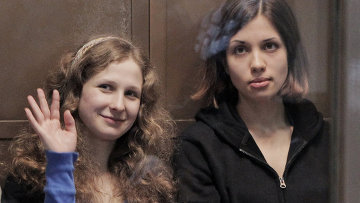MOSCOW, February 7 - RAPSI. The three members of punk group Pussy Riot, who were sentenced to two-year prison terms for staging a protest in Moscow's Christ the Savior Cathedral last year, have filed a complaint with the European Court of Human Rights (ECHR), Kommersant daily reports
Jailed members Nadezhda Tolokonnikova and Maria Alyokhina along with freed member Yekaterina Samutsevich are asking the court to find Russia guilty of violating their rights to the freedom of expression, a fair trial and to be treated with dignity, writes the Kommersant newspaper.
The ECHR has shown significant interest in hearing the Pussy Riot case. Its judges have asked the band's lawyers to send them the necessary documents as soon as possible so that the hearing could begin without delay.
In late February 2012, five young women wearing brightly colored balaclavas performed a "punk-style" prayer at the altar of the Christ the Savior Cathedral.
An edited video of their performance was posted online and caused a public outcry.
The Khamovniki District Court sentenced three Pussy Riot members to two years in prison on August 17.
Later, the Moscow City Court upheld the sentences of Maria Alyokhina and Nadezhda Tolokonnikova, but released Yekaterina Samutsevich on probation, because she had been detained by security prior to reaching the "stage" and thus did not actually participate in the punk rock prayer.
The girls' lawyers, Yonko Grozev and Irina Khrunova, write in their appeal that the Khamovniki court violated Article 10 (Freedom of expression), Article 5 (Right to liberty and security), Article 3 (Prohibition of torture) and Article 6 (Right to a fair trial) of the European Convention on Human Rights.
The lawyers argue that the group's performance in the cathedral cannot be considered a deliberate attempt to cause religious offense, as the prosecution so claimed in court. They say that it was an artistic performance which cannot be judged outside Russia's political context.
The Pussy Riot lawyers have not mentioned any financial compensation so far.
Yekaterina Samutsevich has stated that it is much more important to secure their acquittal than a court ruling against Russian authorities for violating human rights.



